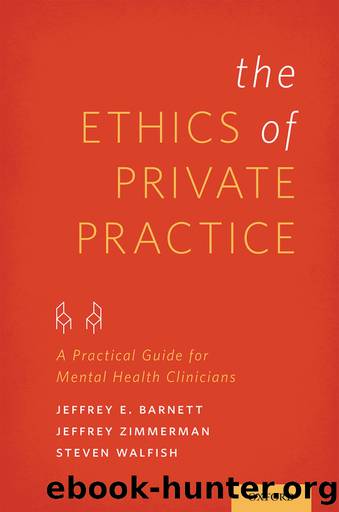The Ethics of Private Practice by Barnett Jeffrey E.;Zimmerman Jeffrey;Walfish Steven;

Author:Barnett, Jeffrey E.;Zimmerman, Jeffrey;Walfish, Steven;
Language: eng
Format: epub
Publisher: Oxford University Press, Incorporated
Published: 2014-08-15T00:00:00+00:00
5
Financial Decisions
Charging fees for providing mental health services and collecting those fees are issues that almost everyone who has chosen to go into private practice has faced. After all, most individuals enter this field âto help othersâ and often this sense of altruism can come into conflict with having to charge and collect fees for the services we provide. This may be especially true when we perceive that paying for our services may be a financial hardship for a client.
Walfish and Barnettâs (2009) First Principle of Private Practice Success states, âYou need to resolve the conflict between altruism and being a business ownerâ (p. 8). If this conflict is not resolved, the private practitioner may become vulnerable to making clinical and business errors and engaging in unethical behaviors. These may occur even when the clinician has the best of intentions and is motivated by a desire to help their client. This is borne out by Barnett and Johnsonâs (2008) statement: âConflicts and misunderstandings related to fees and financial arrangements constitute one of the most frequent and preventable sources of legal and ethical complaints against psychologistsâ (p. 106). Bennett, Bricklin, Harris, Knapp, VandeCreek, and Younggren (2006) present data to support this statement. In reviewing disciplinary actions by the APA Ethics Committee for a 10-year period, they found that insurance and fee problems tied (with nonsexual multiple relationship issues) for the second most frequent category of complaints made against psychologists, superseded only by sexual misconduct.
Barnett and Walfish (2011) suggest that billing and collecting fees should be an easy and straightforward process. The informed consent agreement that has been presented to the client, reviewed with the client, and agreed upon with the client serves as a contract for payment of fees for services provided. However, Barnett and Walfish note there may be resistance from the client and/or the clinician to carrying out this straightforward process. They suggest that resistance from the client may be related to transference issues, such as feelings of entitlement, a discomfort or dislike for âpaying for help,â or an unwillingness to admit they cannot afford fees for psychotherapy. They also suggest that clinician resistance may be due to a lack of training in business (it is the exception rather than the rule that business of practice issues are discussed during graduate training) or countertransference issues, such as (a) not having resolved the conflict between altruism and being a small business owner (possibly resulting in the buildup of a large balance due), (b) âcolludingâ with a client against their managed care company (MCO) to get the insurer to pay for uncovered services, or (c) being fearful of having the client become angry at them (and therefore not reasonably enforcing no-show or late cancelation policies).
The key to reducing ethical transgressions is to include all financial issues in the Informed Consent for Treatment Agreement that the client receives upon entering treatment, and to openly discuss and review this document with each client as part of the informed consent process. This document serves as a financial contract between the client and the private practitioner.
Download
This site does not store any files on its server. We only index and link to content provided by other sites. Please contact the content providers to delete copyright contents if any and email us, we'll remove relevant links or contents immediately.
Application of a Novel Technique for Clinical Evaluation of Nitric Oxide-Induced Free Radical Reactions in ICU Patients by Unknown(696)
Rosenâs Emergency Medicine Concepts and Clinical Practice by Ron Walls; Robert Hockberger; Marianne Gausche-Hill; Timothy B. Erickson; Susan R. Wilcox(572)
Oxidative damage to surfactant protein D in pulmonary diseases by Vitality Starosta1 & Matthias Griese1†(408)
Social Science Perspectives on Global Public Health by Vincent La Placa & Julia Morgan(375)
Constructing Canine Consent; Conceptualising and Adopting a Consent-focused Relationship with Dogs by ERIN JONES(330)
Organic Chemistry: An Acid - Base Approach by MICHAEL SMITH(300)
ADVANCED EMERGENCY CARE AND TRANSPORTATION OF THE SICK AND INJURED by Unknown(271)
Saunders Nursing Drug Handbook 2024 - E-Book by Unknown(263)
Davis's Comprehensive Manual of Laboratory and Diagnostic Tests with Nursing Implications by Unknown(249)
Socio-Life Science and the COVID-19 Outbreak : Public Health and Public Policy by Makoto Yano; Fumihiko Matsuda; Anavaj Sakuntabhai; Shigeru Hirota(247)
Diagnostic and Statistical Manual of Mental Disorders, Fifth Edition, Text Revision (DSM-5-TR(tm)) by Unknown(246)
Human Microanatomy; Cell Tissue and Organ Histology with Celebrity Medical Histories by Stephen A. Stricker(245)
Berne and Levy Physiology E-Book by Unknown(236)
Replacing the Dead by Mie Nakachi;(231)
Handbook of Skin Disease Management by Jiyad Zainab;Flohr Carsten; & Carsten Flohr(229)
Access to Medicines and Vaccines in the South : Coherence of Rules and Policies Applied by the European Union Commission by Stephen Kingah(226)
Deep Learning and Medical Applications by Unknown(222)
The Pocket Guide to Sensorimotor Psychotherapy in Context (Norton Series on Interpersonal Neurobiology) by Pat Ogden(218)
Advances and Technical Standards in Neurosurgery by Unknown(215)
